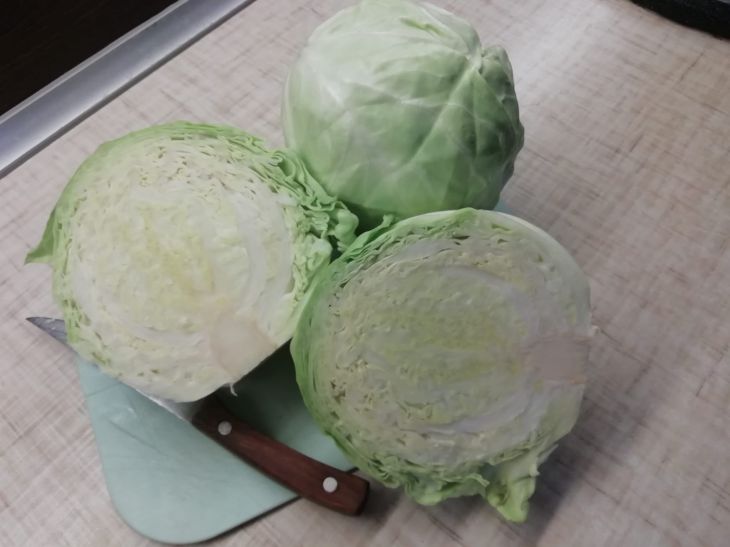You will learn how to choose the right products for your daily diet by reviewing the “healthy seven” products.
All of them are unique in their content of useful microelements and are absolutely necessary for proper nutrition.
Healthy cabbage
Regular white cabbage contains a lot of useful substances necessary for health: vitamin A, B vitamins, vitamin C and U (the latter has a preventive effect on the gastrointestinal tract, preventing the appearance of ulcers).
Cabbage also contains a lot of fiber, so it is good to use it for cleansing the body. Both salads and cabbage broth have healing properties, it is recommended for stomach diseases and constipation.
Cauliflower is good because it has a very high vitamin C content, and it is also gentler, not causing gas. One of the healthiest types is kale.

Benefits of beans
The legume family includes many products that periodically appear on our tables: beans, peas, lentils, soybeans.
At all times they were a favorite food of the lower classes due to their nutritional properties. Which is not surprising, since they contain a lot of protein and fat.
Therefore, legumes can replace meat, which is used by vegetarians. Black, red beans and other varieties have rightfully earned their place in the "healthy seven". They will enrich the body with iron and calcium. This is quite a heavy food, rich in fiber, so older people should eat them in moderation.
And yes, since beans make your stomach work, be prepared for a little flatulence. But it all depends on the individual characteristics of your body.
Benefits of berries
Berries are a real treasure trove of vitamins and useful microelements. It is not for nothing that mothers in childhood tried to constantly feed us cherries, strawberries and wild strawberries.
The effect of blueberries on vision is widely known. And, of course, raspberries are a tasty vitamin treat. These berries are full of vitamin C and antioxidants. Currants are especially rich in vitamin C.
Don't forget about gooseberries and, of course, watermelon. The huge striped berry hides unique properties. Watermelon removes toxins from the body, gives energy, speeds up metabolism and even has a positive effect on the cardiovascular system.
By the way, kiwi is a healthy berry. Kiwi is rich in vitamin C and can compete with bananas in potassium content.
Benefits of Melon
Melon is a favorite delicacy for many. But, in addition to the sugary taste, it also benefits the body, being a source of folic acid, which improves memory and mood.
In addition, it has a high level of potassium, as well as vitamins A, B and beta-carotene. Despite the large amount of sugar, melon is suitable for fasting days, since it is fat-free. But you should not get carried away with it too much.
Benefits of Barley
Many have heard about the benefits of grains, and indeed, there is no better breakfast than a bowl of oatmeal. But among all grains, barley should be especially singled out for its superiority in calories and impact on the body.
It contains vitamins A, E, D, B1, B2, B3 and many microelements (potassium, calcium, silicon, phosphorus, iron, copper, zinc, iodine, etc.).
Moreover, barley contains antibacterial substances. Diabetics, people with low thyroid function, patients with hemorrhoids, prostatitis and various arthritis cannot do without barley or barley groats in their diet.
Healthy fish
The need to eat fish has long been proven by nutritionists. They recommend including seafood in the menu at least once a week. The fact is that fish contains a large amount of phosphorus, which has a beneficial effect on the human brain. Its deficiency leads to memory impairment.
Fish can easily replace meat on the table, because it contains a lot of fat and protein. In addition, it is rich in vitamin B12, as well as unsaturated fatty acids. Salmon is especially rich in omega-3 acids.
Benefits of Seaweed
The Japanese are probably the leaders in the consumption and export of seaweed. Seaweed contains a number of vitamins: A, B1, B2, B3, B6, B12, C, D, E, and this is not a complete list. Since ancient times, the Japanese have used kelp as food, and today it is available to Europeans.
The benefits of this brown algae are obvious: it affects the rate of metabolism, promotes the release of toxins. And due to the high iodine content, it benefits the thyroid gland, which is important in the conditions of iodine deficiency among residents of the CIS.
The large amount of vitamin C puts kelp even above fruits and berries. We are accustomed to seaweed in seaweed salads or sushi. Sheets of pressed seaweed can be stored for a long time. By the way, ice cream also contains some seaweed - they are used in the technological process as thickeners.
We hope that you have learned (or remembered) a lot of interesting facts about familiar products! Use them in food, and the results will certainly be reflected in your well-being and appearance.








